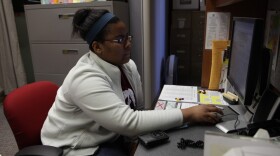From the beginning, Reesha Adamson could sense her calling. She wanted to improve the lives of young people – those of elementary school age, especially – who have behavioral disorders such as oppositional behaviors, depression, anxiety, and attention deficit hyperactivity disorder (ADHD) that manifest themselves in learning environments. Adamson, who is an assistant professor of special education at Missouri State University, explains her educational philosophy and why it's such an important issue for her.
Research shows that 20 percent of students have these disorders throughout their childhood. A lot of those things that go untreated and unhelped get worse as students get older, noted Adamson. So she wondered about the possibilities. What if teachers knew how to better identify and help such students? What if those students knew how to seek help for themselves? And how might that bring about a better future for tomorrow’s leaders?
When you begin discussing education, there are a few philosophies that bubble to the surface. Should the students who are struggling continue in the general education classroom or should these students be placed in a special education environment? There’s not a clear cut, one size fits all answer said Adamson.
Behavior management is the top reason teachers leave the profession, Adamson said, noting that training the teachers and getting students to become engaged could change a child’s trajectory. That being said, students have to have an opportunity to engage with peers as well.




